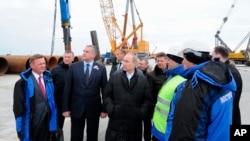Russia has pushed back the completion date of a showcase multi-billion dollar bridge to link the Russian mainland with annexed Crimea by one year, saying the original plan had to be adjusted to take account of the weight of the trains that will cross it.
The Kremlin sees the bridge, which will span the Kerch Strait, as vital to integrating Crimea, which it seized from Ukraine in 2014. President Vladimir Putin has called the project an historic mission.
Extending 19 km (11.8 miles), the project, which will be two separate parallel structures - one for road and another for train traffic - will be the longest bridge Russia has ever built and the longest such dual-purpose span in Europe.
Construction of the road part is on schedule, but Reuters has learned that the rail segment deadline has been put back by a year, giving the contractor - a firm controlled by Putin's former judo partner with no experience of building bridges - more time to complete the 212-billion-rouble ($3.2 billion) project.
The delay underscores the huge logistical, financial and political challenges the Kremlin faces trying to breathe life into the economically deprived Black Sea peninsula at a time when it cannot draw on Western expertise due to sanctions imposed on Russia.
A Russian government order from last year said the bridge had to be operational by December 18, 2018 - a deadline Putin has repeatedly emphasized given the importance of the project to the struggling Russian economy and to Crimea, which Moscow can only supply by sea and air because of a Ukrainian land blockade.
But Rosavtodor, Russia's federal road agency, said in answer to questions from Reuters that the deadline had now been changed and that the rail segment would not be operational until the end of 2019, a year later than initially planned.
"In the process of government experts reviewing the project to build a bridge across the Kerch Strait the deadlines were worked out in detail," a spokesman for the agency said in a statement, calling the original deadline "preliminary."
Building the railway bridge was more time-consuming and technically complex than the road one, he said, because it would have to bear more weight and would need signaling and specia communications equipment.
He did not explain why those factors were not taken into account in the original plan.
"Because of this, the bridge builders will need a little more time to do the rail part of the bridge and plan to start train traffic before the end of 2019," the spokesman said.
The rail element was independent of the road component, he said. That part is on track to open on time at the end of 2018.
Minutes of a meeting Putin held with ministers last month during a visit to the construction site for the bridge – dubbed "Putin's bridge" by some Russians - show the president was informed about the delay at the time and was initially unhappy with what he heard.
The mention of a delay at the meeting near Tuzla Spit – a wind-lashed body of sand that juts into the Kerch Strait towards Crimea - went unnoticed by the media at the time.
The minutes, available on the Kremlin's website, show Transport Minister Maxim Sokolov gave Putin a different explanation to the one supplied by Rosavtodor to Reuters, telling him the railway part was being built later because there was only light rail traffic in Crimea in winter, an excuse that appeared to irritate Putin.
"Railway traffic is light for as long as there is no railway (bridge)," Putin shot back. "If there will be one (a railway bridge) then ports will start to work differently and then there will be traffic."
Putin's judo partner
The contract to build the bridge was last year handed to a firm controlled by Arkady Rotenberg, a close ally of Putin's and his former judo partner. He owns 51 percent of Stroygazmontazh (SGM), the lead contractor.
Rotenberg is under Western sanctions because of Crimea's annexation and Russia's support for separatists in eastern Ukraine. He cannot raise capital in the West or hire Western sub-contractors to help his firm complete the project.
SGM's primary expertise is in building gas pipelines and related infrastructure. It has not built a bridge before and has been forced to hire Russian sub-contractors who have.
A spokeswoman for SGM-Most, the SGM unit handling the project, referred questions about the deadline to Rosavtodor.
Ivan Bedelev, the head of the local administration in Taman, the nearest town to the bridge on the Russian mainland side, said he thought the builders had not realized what they were taking on.
"The original plan was to deliver the road and rail elements all together," Bedelev told Reuters. "But I guess they sized it up and assessed their own strength and decided to change the plan."
The bridge will require major road improvements on both sides of the Kerch Strait. There too problems have arisen.
Construction of a planned four-lane 300-km (186-mile) highway meant to link the Crimean end of the bridge with the contested peninsula's capital has not yet begun after a dispute between the project's designers and the Crimean authorities.
The details are unclear.
Putin, who has a penchant for publicly dressing down ministers, complained at the meeting last month about what he said was the failure of any ministry or individual to take responsibility for overseeing the stalled project to build a highway to the bridge, saying the current setup was "a road to nowhere."
The president, known for his flashes of dark humor, said: "There should be a specific person who can be hanged if it's not done."





